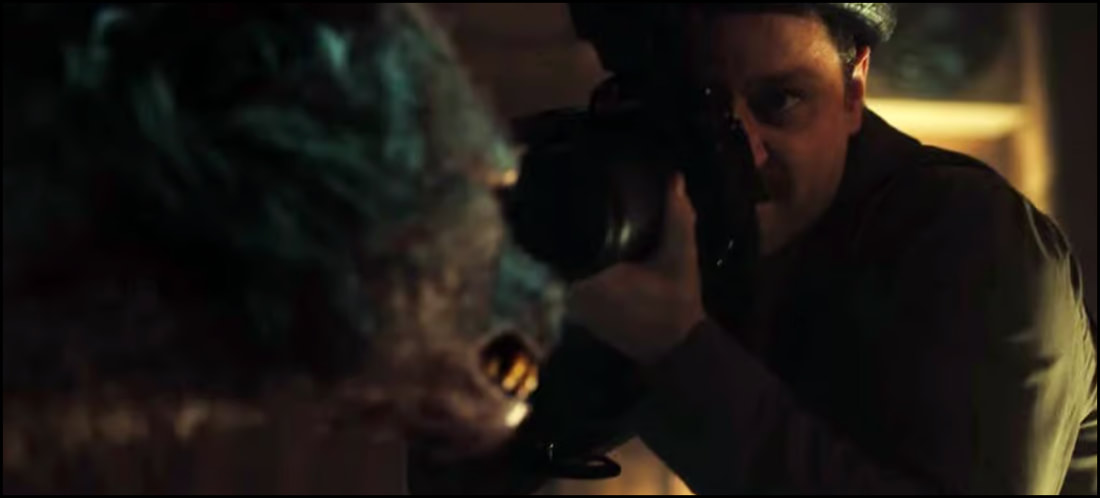From the episode’s IMDB.com page citation:
“A troubled starlet is dogged by invasive paparazzi while dealing with the consequences of a hit-and-run incident.”
Who's afraid of the big bad wolf?
Well, I guess that depends on just who the wolf truly is.
It goes without saying that the very best anthologies – past and present – often do rely on some storytelling misdirect in order to achieve the biggest gasps from their at-home audiences.
You know how this works, don’t you? The story begins, and – for all intents and purposes – it typically looks like something you may or may not have seen before. Any yarn’s opening shots are damn near predicated on establishing some understandable playing field for which these new characters are about to intersect. The resulting drama of their intersections is, therefore, gauged on how well the tale fatefully changes direction: fans of the M. Night Shyamalan library will call it ‘the big twist,’ and TV anthologies in particular have been making great use of this storytelling framework since … since … well? I guess since TV anthologies began.
In all honesty, I haven’t been all that impressed with a good deal of Black Mirror’s run. This isn’t to say that I haven’t been entertained because that would be pretty far from the truth; what it does mean, however, is that those episodes relying heavily on these thematic misdirects just haven’t been either all that fresh or delivered with the kind of ‘punch to the gut’ that I think worthy of highlight. Again, I realize some of this comes down to a judgment call by each viewer – what surprises you may not be what surprises me, and vice versa, just like what I like, expect, and reward in any story tends to differ – but I’d still argue that Mirror’s production qualities and casting choices have far surpassed most of its episodes endurability, meaning I’ve very little desire to watch them again after viewing them once.
Again, folks: I’m only speaking for me. That’s all I ever speak for. You do you. I do me. Feel free to differ, as such is life.
That rewatchability might just change with “Mazey Day.”
Emmy-nominated director Uta Briesewitz rather masterfully takes viewers on a wonderfully dark and delightful visual interpretation of Charlie Brooker’s winking-and-nodding dissection of modern celebrity. What you think is going to be a commentary on our cultural (and unhealthy) obsession with knowing all that we can with screen starlets instead turns out to be an indictment of those who traffic in such gossip. Yes, Briesewitz, Brooker, and crew might be throwing out a few barbs about our society-at-large and just how far we’ve sunk into the mire of contemptibility on a regular basis; but I think the hour’s last scene – that of a picture taker’s willingness to meet her latest subject’s dying wish and, yet, still do her job – is the kind of thing that ought to produce chills far greater than any bloodied and frenzied attack caught earlier in the episode. Showing just how far one paparazzi photographer is willing to go to capture the perfect pic of a life in transition … all for the sake of the mighty dollar … ought to frighten everyone.
Still, that isn’t the only misdirect involved in telling Mazey’s story. It’s just the better one. The first half relies on Brooker taking his viewers in one calculated direction – suggesting that the young starlet has engaged in a hit-and-run while high on mushrooms – truly aims audiences at a rather easy target. Right? Today’s 24-hour news cycle has produced endless content about actors, actresses, directors, producers, and the willing lackies doing some unconscionable things (cue Harvey Weinstein, Joss Whedon, and Jussie Smollet for the big wins), but that would be a rather easy if not somewhat lazy construct for the territory usually staked out by Black Mirror. And – for that matter – so are the scenes and suggestions that celebrity doctors have also engaged in such nefarious tactics that under normal circumstances would be a violation (minimally) of the Hippocratic Oath.
However, those are necessary evils meant to conceal what truly afflicts Mazey (played by Clara Rugaard). While her destiny was undoubtedly affected by a chance encounter (with a lycanthropic twist), our central photographer and narrative adversary Bo (played by Zazie Beetz) chose the road to Hell entirely of her own conviction.
Black Mirror’s “Mazey Day” (S06E04) was produced by Charlie Brooker and company in cooperation with Netflix. The episode is currently available for viewing on the streaming giant. As for the technical specifications? While I’m no trained video expert, I thought the accompanying sights and sounds were exceptional from start-to-finish. Also, I absolutely loved the werewolf effects in the hour. Some of them appeared practical, and I’ve no doubt some of them were CGI, but kudos to the effects team all around as this was exceedingly well crafted.
Highly recommended.
As I said above, I realize that not every story measures up to fandom’s expectations, but I found “Mazey Day” one of Black Mirror’s better diversions. I say this largely because it didn’t quite go where I imagined, taking me instead into a contemporary variation (of sorts) – a riff, if you will – of Joseph Campbell’s “Heart Of Darkness.” You go into any journey thinking you know who the villain will be, and this one surprised me in a few ways that rewarded my patience with something to think about in its last scenes. At my advanced age? That’s rare. And worthy of reward.
In the interests of fairness, I’m pleased to disclose that the entire sixth season of Black Mirror is presently available to me as a current Netflix subscriber, and I was provided absolutely no advance screening of any episodes in exchange for a complimentary review.
-- EZ


 RSS Feed
RSS Feed